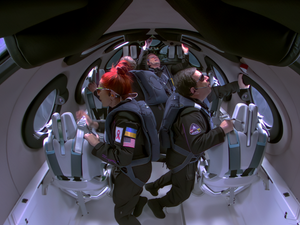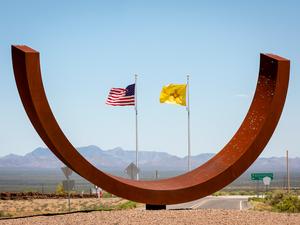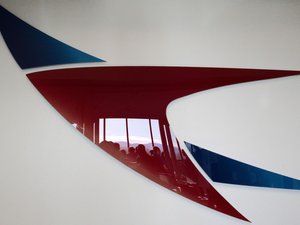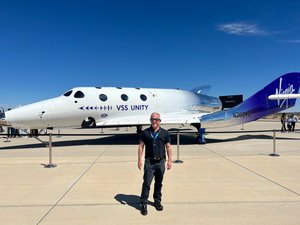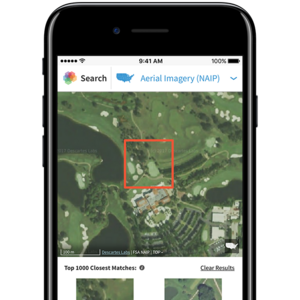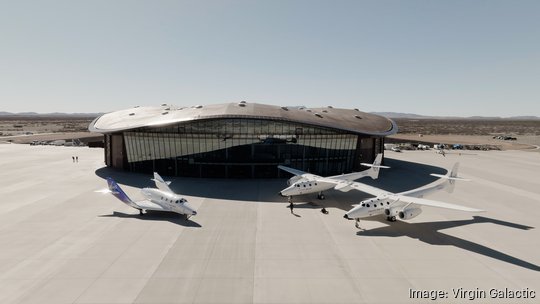
Virgin Galactic said the company could generate upwards of $1 billion in annual revenue from spaceflights at spaceports around the world — including New Mexico's Spaceport America — once its next-generation spaceships are in full operation.
That's because, as Virgin Galactic's CEO Michael Colglazier said during the company's fourth quarter and full-year 2023 earnings call Tuesday, Virgin anticipates flying as many as 400 times per year out of each spaceport with its next generation of spaceships, called the Delta class.
The company pivoted its business operations in early November to focus on readying those Delta-class ships for commercial operations, a move that came with 73 layoffs in New Mexico. It laid out a timeframe that would see its Delta ships begin flight testing operations at Spaceport America in mid-2025 and begin revenue service in 2026.
Colglazier reinforced that timeframe on Tuesday afternoon, noting that a facility being built in Mesa, Arizona, to assemble the Delta-class ships remains on track to open in mid-2024. That facility includes two buildings, one for assembling the Delta spaceships and another for assembling Virgin Galactic's "motherships," which it uses to carry its spaceships before firing into space.
Once tested and ready for commercial service, Colglazier said Virgin Galactic wants each spaceport to house up to five Delta-class ships and two motherships.
With as many as five spaceships flying up to 400 teams per year at a per-seat ticket price of $600,000, Virgin's CFO Doug Ahrens said on the call the company could generate approximately $1.1 billion to $1.4 billion in revenue per spaceport annually from spaceflights. Its Delta ships are built to hold six people and generate as much as $3.6 million in revenue per flight, whereas the company's current "Unity" spaceship only has four seats and generates up to $2.4 million in revenue per flight.
That annual revenue figure dwarfs Virgin Galactic's reported revenue of $6.8 million in the full year of 2023. The company reported revenue of $2.8 million in the fourth quarter of 2023, driven primarily by spaceflights and membership fees from future astronauts.
The revenue figure is also based on an increase in ticket costs. Colglazier said the company plans to up its per-seat ticket prices to $600,000 from $450,000.
Virgin Galactic has a current backlog of around 725 future astronauts, Colglazier said, and while general ticket sales are currently closed, he added sales could reopen once Virgin's Delta ships get close to entering revenue service.
But it'll be a few years until Virgin Galactic could realize its billion-dollar earnings potential. Colglazier, Virgin's CEO, has said the company expects to hit positive cash flow in 2026 once its Delta ships start revenue service. It would take only two operational Delta ships to reach positive cash flow, and Virgin is building its assembly facility near Phoenix to produce as many as six ships per year.
And although Virgin Galactic's founder Sir Richard Branson said he doesn't plan to invest further in the company, Colglazier and Ahrens said Virgin still has enough money to ready those first two Delta ships for revenue service and break into the black.
Price of Virgin Galactic stock (NYSE: SPCE) closed Tuesday at $1.90 after opening that day at $1.77. It's seen a general downward trend over the past two months after hitting $2.70 on Dec. 27, per MarketWatch.
Details on Virgin Galactic's long-term spaceport play
Spaceport America, the $250 million, 18,000-acre facility near Truth or Consequences, is currently the only spaceport where Virgin Galactic runs spaceflight operations. The Mojave, California-based company has an ongoing lease with the New Mexico Spaceport Authority for its $200 million-plus "Gateway to Space" hangar and operations facility at Spaceport America, which expires in 2033.
Scott McLaughlin, the Spaceport's executive director, told New Mexico Inno in late November the Spaceport Authority would consider incorporating a per-flight revenue component to a renewed lease with Virgin. He said the lease agreement was amended in 2018 to drop a per-flight revenue component that was previously included.
But Spaceport America might not be the only spaceport Virgin Galactic plans to operate at in the future. When asked during Tuesday's call, CEO Colglazier said starting operations at a new spaceport is a five-year process. With that, he said 2029 could be "the right place" to open up at a second spaceport.
Colglazier said there are several spaceports in the U.S. and worldwide where Virgin Galactic could go, although he didn't name any specific sites.
He did say, however, the company could "functionally double" its infrastructure at Spaceport America and run a "twin operation" there in the future, as an alternative to setting up shop at an entirely new site.
Regardless of whether it's Spaceport America or a different site, Colglazier said a fully utilized spaceport could be the "primary economic engine" for both Virgin Galactic and surrounding communities. That's because, aside from just spaceflights, Virgin envisions spaceports acting as a sort of tourist hub for their surrounding areas, by hosting dozens of guests for several days at a time who are interested in watching its Delta ships fly.
Those guests, Colglazier noted, would need to stay at local hotels and dine at local restaurants, something the executive positioned as a boon to surrounding economies. The company is just at the "tip of the iceberg" in terms of what its spaceflight experience could become, he added.
"That's a big part of why, in this case, the state of New Mexico has been so excited to have us come and get the business scaled, because that starts to drive benefits that have multiplier effects throughout the community," Colglazier said. "We definitely will pursue growth in those angles, but first things first — let's get the ships built and then we can go after scaling the rest."
Status of FAA investigation, next flight plan
Virgin Galactic plans to pause flights out of Spaceport America later this year as it preps its Delta ships for revenue service. Its most recent flight in New Mexico, dubbed "Galactic 06," was in late January with a four-person private astronaut crew.
Following that flight, Virgin reported to the Federal Aviation Administration that an alignment pin detached from its mothership, VMS Eve, during the mission. Although Mike Moses, the company's president of spaceline operations, said the pin detachment didn't pose a safety threat during the flight, Virgin's spaceflight operations are on pause while the FAA reviews the situation.
The company, in a Feb. 5 news release, said both the alignment pin and shear pin fitting assembly, used to align the spaceship and mothership while the two are flying together, "performed as designed during the mated portion of the flight, and only the alignment pin detached after the spaceship was released from the mothership."
Moses said the company doesn't expect the FAA review to impact the timing of its final Unity commercial flight at Spaceport America, currently planned for the second quarter of 2024. CEO Colglazier said that flight, "Galactic 07," will have a "blended manifest," meaning VSS Unity will carry both researchers and private citizens on board.
This story was updated to note Virgin Galactic expects to reach positive cash flow in 2026, not 2027.
